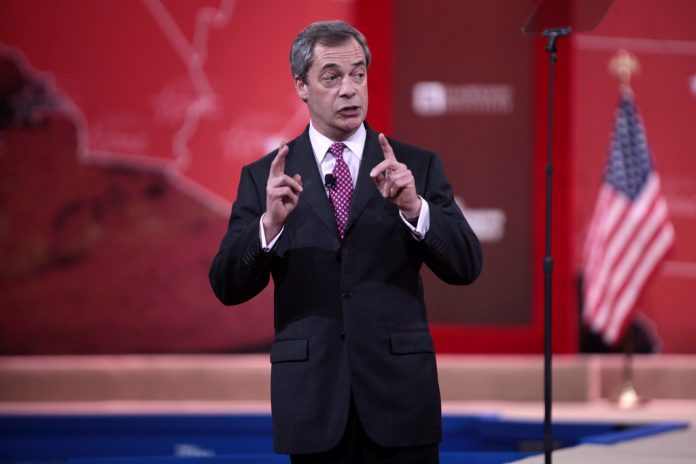First came Brexit, then came Trump — and now it’s happening again.
In June 2016, Britain voted to leave the European Union.
This month, Brexit’s mastermind, Nigel Farage, returned to the fore of British politics.
He’s running in next month’s U.K. general election, but Farage’s real aim isn’t to get a seat in Parliament; it’s to replace the Conservative Party with a new populist force of his own.
The worse Conservatives do on July 4, the fateful election day chosen by Prime Minister Rishi Sunak, the more power Farage accrues.
That’s true regardless of whether Farage prevails in his own race.
It’s even true if his party, Reform U.K., wins no seats at all.
What Farage wants to prove is simply that Conservatives can’t win without his issues.
Donald Trump is a ballot-box success in a way Farage isn’t.
But Farage is a brilliant long-term planner, and what he’s doing in the U.K. has implications for the Republican Party here.
He gives us a peek into what the GOP’s post-Trump future looks like — because Farage proves that a right-leaning party that isn’t also a populist party is doomed in the 21st century.
Before Farage decided to run, Sunak’s parliamentary majority was already facing extinction.
Polls showed Labour winning a huge, historic victory.
But the Conservatives had reason to think the agony Farage and Brexit had imposed was behind them at long last.
From the 1990s until Brexit’s eventual implementation under Conservative Prime Minister Boris Johnson, the Conservatives were bitterly split over the E.U.
Farage’s earlier vehicle, the U.K. Independence Party, was designed to force Conservatives to the right on Europe by threatening to divide their electoral coalition.
The strategy worked — to keep his party together, David Cameron, a Conservative prime minister who favored remaining in the E.U., had to schedule a popular referendum on Brexit, which he lost.
For three more years, the Conservatives struggled to find a leader who’d follow through on Brexit.
When Johnson promised to do so, the party’s Farage problem went away, and the Conservatives won a smashing victory in the 2019 general election.
Yet COVID controversies ended Johnson’s tenure prematurely.
The Conservatives then tried to go back to the future, picking the closest thing they still had to a free-market Margaret Thatcher, Liz Truss, as the next leader and prime minister.
Truss’s premiership lasted barely a month; she simply couldn’t garner enough support from her own party’s members of Parliament to remain in office.
That’s how the Conservatives wound up with Sunak, a man characterized not by a vision that inspires colleagues or voters but by the absence of overtly divisive qualities.
Because Sunak stands for little, his fall wouldn’t mean much, either — in the absence of Farage.
But now that Farage is back, there’s again a divisive issue Conservatives can’t ignore: immigration.
Brexit was only the beginning; Farage and Reform U.K. are set to use the same playbook to push British politics to the right on immigration.
A startling YouGov poll last week found Reform U.K. beating the Conservatives 19% to 18%, with Labour far in the lead at 37%.
Experts don’t expect Reform to perform so well in the election, but again it doesn’t have to: Farage only needs to make his issue indispensable to any right-wing party that hopes to win.
He might never become prime minister or even a member of Parliament.
But if he keeps up the pressure, Farage will drive the Conservatives to adopt leaders who resemble him — the only kind who can attract his voters.
Old-guard Republicans are as eager to get past Trump and Trumpism as the Conservatives were to get beyond Farage and Brexit.
But immigration is the defining issue of our time on both sides of the Atlantic, not only in America and Britain but on the European continent, too, as demonstrated by last week’s E.U. elections.
Immigration restriction has a popular constituency throughout the Western world, and one that’s impatient with older center-right parties reluctant to take up the cause.
Trump and Farage both perceived that, and while nobody else can be Donald Trump, Farage’s strategy is one other politicians, including Republicans after Trump, can employ.
Here the Farage strategy doesn’t require a new party; the same pressure can be applied to the Republican establishment through primaries.
Whether or not populist Republicans win a general election, simply by making it impossible for other Republicans to win without them, they gain leverage the way Farage has.
The flipside also applies — populists might not win without immigration-loving, business-oriented Republican or Conservative voters — but populists ultimately care more about the issue.
What London financier wants to jeopardize lower taxes for the sake of higher immigration?
Brexit and Trump’s election were eight years ago, but 2016 is still the present and future of the political right.
Daniel McCarthy is the editor of Modern Age: A Conservative Review. To read more by Daniel McCarthy, visit www.creators.com
COPYRIGHT 2024 CREATORS.COM
For more great content from Rights, Justice & Culture News.
For more from The Heartland Institute.






